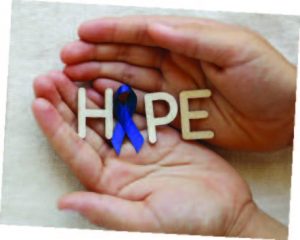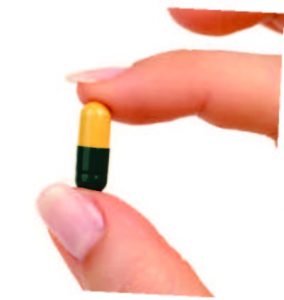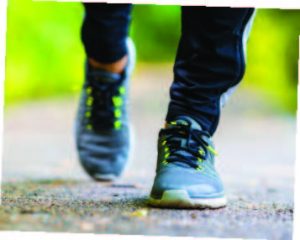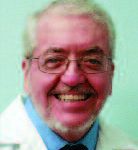News, views and insights on maintaining a healthy edge.
Colorectal Cancer Rates: Good News, Bad News
 Seventeen years ago, President Bill Clinton officially set aside March as National Colon Cancer Awareness Month. On the 3rd of the month this year, you’ll see a lot of blue stars around; that Friday is Dress in Blue Day (dressinblueday.org). The good news is that, since 2000, there has been a marked drop in colorectal cancer incidence—more than 30 percent among Americans 50 and older. The distressing news is that,
Seventeen years ago, President Bill Clinton officially set aside March as National Colon Cancer Awareness Month. On the 3rd of the month this year, you’ll see a lot of blue stars around; that Friday is Dress in Blue Day (dressinblueday.org). The good news is that, since 2000, there has been a marked drop in colorectal cancer incidence—more than 30 percent among Americans 50 and older. The distressing news is that,

Samiappan Muthusamy, MD
Past Chief of Gastroenterology/Endoscopy, Trinitas
according to several recent studies, over the next 15 years, the number of colon and rectal cancer cases among adults 20 to 34 is projected to practically double. Cases among adults 35 to 49 are also expected to increase. “The plummeting rates in adults 50 and over were attributable to greater awareness of the importance of screenings and colonoscopies,” says , past Chief of Gastroenterology/Endoscopy at Trinitas. “However, because there are no set guidelines for screenings
of younger Americans, these types of cancers—though relatively unusual between ages 20 and 50—may go undetected. If you have a family history of colon cancer, especially a close family member who was diagnosed before the age of 60, then a colonoscopy is recommended by the time you turn 40.”

The Popsicle Cure
Over the remaining few weeks of winter, there’s a good chance that someone will bring a bug into your home or workplace. If you catch it, one of the symptoms is likely to be a sore throat. In case it’s been a while since you’ve had to deal with this kind of dryness and pain, there are a few important things to remember. According to the National Institutes of Health, keep your throat moist. That means drinking lots of fluids, and having saliva-producing lozenges or hard candies handy. You can even treat yourself to an occasional popsicle. These will help with dryness. Throat sprays and either acetaminophen, ibuprofen or aspirin are good pain-reducers. If soreness persists beyond the normal length of a cold—or if it is accompanied by a fever—see your physician and make sure it’s not strep or tonsillitis.
Networking Error
 Facebook took a lot of heat for propagating “fake news” during the past election, but according to researchers at Lancaster University, there’s something even more depressing: Facebook itself. In a survey of 35,000 people between the ages of 15 and 88, the Lancaster study found that Facebook users who compared themselves negatively with others were at increased risk of depression. Those at greatest risk were individuals who “friended” former partners, made frequent negative status updates or felt intense envy when they observed the “life highlights” of others. The research did point out that social media engagement could also help with depression—when used as a mental health resource or to enhance social support.
Facebook took a lot of heat for propagating “fake news” during the past election, but according to researchers at Lancaster University, there’s something even more depressing: Facebook itself. In a survey of 35,000 people between the ages of 15 and 88, the Lancaster study found that Facebook users who compared themselves negatively with others were at increased risk of depression. Those at greatest risk were individuals who “friended” former partners, made frequent negative status updates or felt intense envy when they observed the “life highlights” of others. The research did point out that social media engagement could also help with depression—when used as a mental health resource or to enhance social support.

Engineering Marvel
When doctors can’t solve a problem, it’s not a bad idea to let the engineers have a crack at it. A case in point is a breakthrough in hemophilia treatment. Researchers at the Cockrell School of Engineering at The University of Texas at Austin have come up with a special capsule that will soon be able to deliver treatment for those who suffer from the hereditary bleeding disorder. The capsule releases micro- and nano-particles that carry a protein therapy that treats hemophilia B. Hemophilia B is caused by a missing or defective factor IX, a clotting protein. Currently, hemophilia treatment is painful and expensive, and is often unavailable in remote regions of the world. As a result, hemophiliacs in developing countries often die in childhood. “Our new oral delivery of factor IX can now overcome these issues and improve the worldwide use of this therapy,” says Sarena Horava, the study’s lead author.
Wait…What?
 More and more women are becoming mothers in their late 30s and 40s than ever before. Although there are certain health risks associated with later pregnancies, researchers at the University of Southern California report that women who have their final baby at age 35 or older appear to have an advantage later in life. The USC study looked at 830 post-menopausal women and noticed that those who had their last baby at age 35 or older had sharper cognitive skills at age 60 than women who stopped bearing children earlier on. Dr. Roksana Karim, who led the study, noted that she would not advise women to wait and have their final child after age 35.
More and more women are becoming mothers in their late 30s and 40s than ever before. Although there are certain health risks associated with later pregnancies, researchers at the University of Southern California report that women who have their final baby at age 35 or older appear to have an advantage later in life. The USC study looked at 830 post-menopausal women and noticed that those who had their last baby at age 35 or older had sharper cognitive skills at age 60 than women who stopped bearing children earlier on. Dr. Roksana Karim, who led the study, noted that she would not advise women to wait and have their final child after age 35.
The study also found that women who had been pregnant twice or more had better cognitive skills later in life than those who had only been pregnant once. More work is needed to explain these links, but researchers suspect they are related to exposure to higher levels of estrogen.
Digging New York
 While medical researchers brave the wilds of the Amazon and other remote regions of the world to look for new medicines, researchers from Rockefeller University have discovered promising microbes a bit closer to home: in the dirt of New York City parks. According to the Proceedings of the National Academy of Sciences, researchers tested 275 samples and found genetic evidence of bacteria capable of producing a wide array of compounds that can be harnessed for new medicines for cancer, as well as for bacterial and fungal infections. “The sheer diversity we saw suggests there are many more potentially valuable compounds out there awaiting discovery,” says Professor Sean Brady, who heads up Rockefeller’s Laboratory of Genetically Encoded Small Molecules. “Even in a place as mundane as urban soil.” One sample from Brooklyn contained genes that encode 25 molecules that are being studied for potential use as antibiotics and other types of medicines.
While medical researchers brave the wilds of the Amazon and other remote regions of the world to look for new medicines, researchers from Rockefeller University have discovered promising microbes a bit closer to home: in the dirt of New York City parks. According to the Proceedings of the National Academy of Sciences, researchers tested 275 samples and found genetic evidence of bacteria capable of producing a wide array of compounds that can be harnessed for new medicines for cancer, as well as for bacterial and fungal infections. “The sheer diversity we saw suggests there are many more potentially valuable compounds out there awaiting discovery,” says Professor Sean Brady, who heads up Rockefeller’s Laboratory of Genetically Encoded Small Molecules. “Even in a place as mundane as urban soil.” One sample from Brooklyn contained genes that encode 25 molecules that are being studied for potential use as antibiotics and other types of medicines.
Walk Before You Run
 So your big New Year’s resolution was to try your first 5K run this spring? Where there’s a will, there’s a way as they say. But you may need to do more than buy a
So your big New Year’s resolution was to try your first 5K run this spring? Where there’s a will, there’s a way as they say. But you may need to do more than buy a

Jim Dunleavy, PT DPT MS Director, Rehabilitation Services 908.994.5406
new pair of running shoes. According to the American Council on Exercise, you’ll need to give yourself at least
five weeks to prepare. At the start, it’s important to walk and run about 25 minutes four days a week—and then gradually increase the distance and duration, as well as varying the workout. Also, have a high-carb snack before you workout, and drink lots of water.
Before entering your first 5K, or when starting any exercise program check with your medical doctor first—especially if you have any chronic conditions such as a cardiac, lung or blood condition, says Dr. Jim Dunleavy PT DPT MS, physical therapist and Director of Rehabilitation Services at Trinitas. “Also, remember to set reasonable distance and time goals and slowly build up to your ultimate goal in order to avoid joint, muscle and tendon issues.” Finally, check out the course so there are no surprises on race day.




